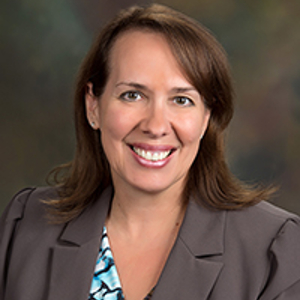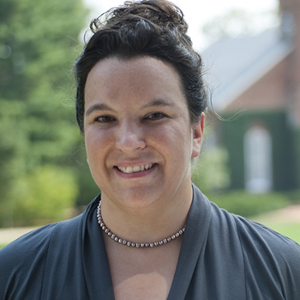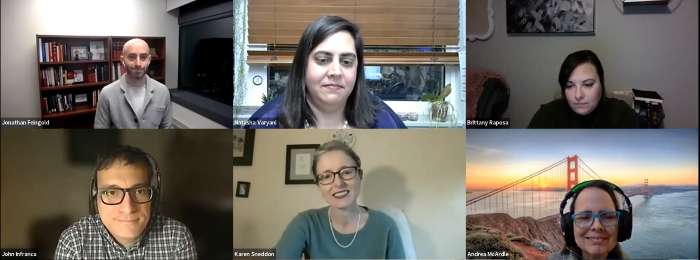What are the best ways for faculty to get involved with this section?
AJB: The best way for interested faculty to get involved is to attend our programs throughout the year as well as at the Annual Meeting. Put in a proposal call for papers so that people can hear your ideas and be a part of the conversation. Participate in the Q&A after programs, the business meeting, the Property Section Breakfast, and the New Voices panel. Get in touch with officers if you’re interested in joining the section leadership.
It’s energizing to collaborate with people who are working on similar issues as you. There are a lot of opportunities to get involved. This section is very broad, so you don’t have to necessarily be teaching first-year property law. If you’re teaching anything that has to do with property, you can be a part of the section.
What kind of work do your section members do?
AJB: There are members whose primary focus is constitutional law, while others focus on development issues, such as affordable housing and zoning. We have members that focus on property rights and racial and social justice issues, which are also involved with poverty. We also have members that specialize in natural resource allocation. Our members contribute to work in many different areas of property law.
JF: Our members are legal historians, like myself, who focus on real estate transactions, mortgages, financing and fair financing of housing, and homeowner’s associations. We also have a lot of members who are interested in the intersection of property and environmental law.
How do your section members interact and collaborate outside of the Annual Meeting?
AJB: We have a discussion list for members to interact. You can change your notification settings so that you can get messages either as emails or as a digest. The sections where I’m the most involved, I get individual emails. The section discussion lists that I like to keep track of, but I’m not as intimately involved in, I get a digest. It’s a great tool for keeping up with sections.
Last year, we hosted webinars during lunchtime in the spring and summer. We just started a mentorship program where we are trying to connect junior professors with someone who’s senior in the academy to get advice. If anyone is interested, contact me because we could push this idea further. There’s another group, Association of Law Property and Society, that is academic focused.
How did you get interested in property law
JF: I tell my students all the time that I was genetically destined to do property law. I was born and raised in Eastern Kentucky in the middle of the Appalachian Mountains in a community that was mostly farming families, like my family. At the same time, the area was surrounded by strip mines and environmental devastation. From the earliest age, I can remember my family teaching me how valuable land was and how much it mattered for my family. My grandfather would tell me about living through the Great Depression. Despite never having cash, my family survived because they lived off the farm. They would dry, freeze, and can the produce and share with their neighbors. On the contrast, these farms were surrounded by mining companies that destroyed everything. Hearing and seeing this as a kid, it gave me the understanding that land means everything but also that land means nothing. I was left trying to figure out the truth. That question became the organizing framework for how to think about things in my life.
AJB: I came into property by accident. I was interested in other cultures and languages in school and I had majored in Russian and International Relations. I went to the Fletcher School at Tufts University before law school and I studied international relations, particularly international law.
One of the most interesting parts of international law was disputes over resources and boundaries. It’s a different sort of property law because you don’t have an overarching legal enforcement system, there are just negotiations. Then when I was in law school, I thought I would do international law. I ended up doing private international law, which is another word for New York law with international clients. I had a lot of clients that were from different countries, but the law that was applying was New York finance law. My favorite part of what I was doing were the transactions that had to do with real property assets. I liked that there was something tangible involved in those transactions, as opposed to ones that just involved transferring money.
Then, I became an in-house counsel with a developer and we were focused on real property law. This involved common interest communities, land purchases, and land development issues. It wasn’t until I got into teaching property and real estate that I discovered additional issues that come from the way we allocate power and property. That is why I try to focus on those issues in my research. I never would’ve predicted when I was in law school that I would be a property teacher, but I love it. It’s a great class to teach and a great area to focus on.
What is your section planning for the 2023 Annual Meeting?
AJB: We are doing a joint session with the Section on State and Local Government Law. We’re doing a session that is called “Neighborhoods and Future of Residential Land Use, Who Should Decide Where and How we Live?” We’re excited about this session because there are a lot of things that are being determined right now in terms of housing supply, climate change, post-pandemic property, and the issues of evictions, racial equity, homelessness, and much more. The real question is who decides; is it state or local? We don’t have pre-selected speakers so we can invite a lot of input. We’re putting out a call for papers under this broad rubric as well. We are hosting the “Stuff You Want to Steal” pedagogy session again this year. This session allows professors to share something they created in their classroom for other professors to then use in their teaching. We are also hosting a New Voices session. This session invites anyone who is new to the academy to share their work. We are working on co-sponsoring sessions, such as panels with the Section on Environmental Law and the Section on Real Estate Law.
How has property law and your approach to teaching changed over time?
JF: I have moved more to teaching current issues more than traditional rules over time.
Even if those are things that I won’t test, I still like to make sure that my students are aware of what’s happening in developing issues. I still use a basic textbook from Aspen, but I find that I give the students more materials that are from a case that’s just been decided. I also spend time incorporating other perspectives on property into my class. For example, I was sharing with my class an email I received from a friend in Ukraine where she said, “This is my land and it’s the only thing that I have so I’m not leaving.” In sharing this, I tried to give my students a perspective on why property matters in a scheme of democracy, citizenship, and social responsibility. Property law is entangled with racial and social justice, too. I try to incorporate these perspectives into my teaching. Over time, I have switched books when teaching property. I am on my fifth book. As any teacher knows, changing books makes it harder to teach because you have to learn the new content. This has helped me become a more complete professor.
What do you think are the long-term and short-term effects of COVID-19 pertaining to property law?
AJB: I think that we’re seeing a big disruption in a lot of areas with real estate. I think that there’s some disruption in how we use commercial property and office space. There’s also been a big disruption in the commercial leasing and retail leasing markets. I think one of the biggest disruptions is now we’re starting to rethink our assumptions about housing and the impact that has in our community.
As a country, I think we have been so wedded to the idea that housing is a private issue and its private benefits being traded. With this long eviction moratorium and the focus on the impacts to the community of unhoused people during the pandemic, I think it has destabilized enough that perhaps there’s going to be a reconsideration of things that have been suggested by the academy for a while, but have really been on the outskirts of political consideration, like housing being more of a public good and housing being more of a right. It will be interesting to see if there can be some long-term impacts, which I think would be for the better for our society. If we provide adequate shelter and a place for people to be in our society, it benefits us all.
In addition, there were a lot of social justice and racial justice discussions as a country during the pandemic and I think it’s going to change perspectives on property law as well.
What makes your section unique?
AJB: The Section on Property Law is unique because of how broad it is. There are so many unique aspects and components of property law. We have diversity among the membership in terms of what we do and focus on. That creates a lot of opportunities for our members to learn from each other.



